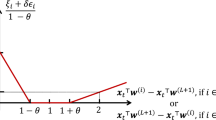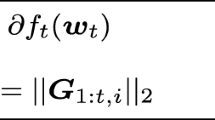Abstract
In this paper, we proposed an incremental max-margin model for semi-supervised multi-classification learning, where efficient and accuracy need to be considered. Three notable properties are introduced: (1) the model predicts a label for unlabeled sample instance in runtime, and trained with the complete sample instance, while unlabeled and labeled sample instances are unified in our objective function; (2) since the objective function of our model is convex, we can design efficient online algorithm with logarithmic regret, it achieve accurate solution with very little overhead; (3) our model is max-margin machine, which provide our model with considerable generalization capability for future unseen data. Our approach captures essences of the exploration-exploitation tradeoff.
Access this chapter
Tax calculation will be finalised at checkout
Purchases are for personal use only
Similar content being viewed by others
References
Daniely, A., Shalev-Shwartz, S.: Optimal learners for multiclass problems, arXiv preprint arXiv:1405.2420 (2014)
Zhu, X., Goldberg, A.B.: Introduction to semi-supervised learning. Synth. Lect. Artif. Intell. Mach. Learn. 3(1), 1–130 (2009)
Valizadegan, H., Jin, R., Jain, A.K.: Semi-supervised boosting for multi-class classification. In: Machine Learning and Knowledge Discovery in Databases, pp. 522–537, Springer, Berlin(2008)
Xing, E.P., Jordan, M.I. Russell, S., Ng, A.Y.: Distance metric learning with application to clustering with side-information. In: Advances in neural information processing systems, pp. 505–512, (2002)
Saffari, A., Leistner, C., Bischof, H.: Regularized multi-class semi-supervised boosting. In: IEEE Conference on Computer Vision and Pattern Recognition, 2009. CVPR 2009, pp. 967–974 (2009)
Wang, B., Tu, Z., Tsotsos, J.K.: Dynamic label propagation for semi-supervised multi-class multi-label classification. In: 2013 IEEE International Conference on Computer Vision (ICCV), pp. 425–432 (2013)
Azran, A.: The rendezvous algorithm: Multiclass semi-supervised learning with markov random walks. In: Proceedings of the 24th international conference on Machine learning, pp. 49–56, ACM, (2007)
Goldberg, A., Recht, B., Xu, J., Nowak, R., Zhu, X.: Transduction with matrix completion: Three birds with one stone. In: Advances in neural information processing systems, pp. 757–765, (2010)
Jebara, T.: Machine Learning: Discriminative and Generative. Kluwer Academic, Boston (2004)
Shalev-Shwartz, S., Kakade, S.M.: Mind the duality gap: Logarithmic regret algorithms for online optimization. In: Advances in Neural Information Processing Systems, pp. 1457–1464 (2009)
Srebro, N., Sridharan, K., Tewari, A.: On the universality of online mirror descent. In: Advances in Neural Information Processing Systems, pp. 2645–2653 (2011)
Blei, D.M., Ng, A.Y., Jordan, M.I.: Latent dirichlet allocation. J. Mach. Learn. Res. 3, 993–1022 (2003)
Boyd, S., Vandenberghe, L.: Convex Optimization. Cambridge university press, Cambridge (2004)
Shalev-Shwartz, S.: Online Learning: Theory, Algorithms, and Applications, Ph.D. thesis, Hebrew University of Jerusalem (2007)
Acknowledgments
This work is supported by the National Natural Science Foundation of China (No.61379069) and the Key Technologies R&D Program of China (No.2014BAK09B04).
Author information
Authors and Affiliations
Corresponding author
Editor information
Editors and Affiliations
Rights and permissions
Copyright information
© 2016 Springer International Publishing Switzerland
About this paper
Cite this paper
Hu, T., Yu, J. (2016). Incremental Max-Margin Learning for Semi-Supervised Multi-Class Problem. In: Lee, R. (eds) Software Engineering, Artificial Intelligence, Networking and Parallel/Distributed Computing 2015. Studies in Computational Intelligence, vol 612. Springer, Cham. https://doi.org/10.1007/978-3-319-23509-7_3
Download citation
DOI: https://doi.org/10.1007/978-3-319-23509-7_3
Published:
Publisher Name: Springer, Cham
Print ISBN: 978-3-319-23508-0
Online ISBN: 978-3-319-23509-7
eBook Packages: EngineeringEngineering (R0)




